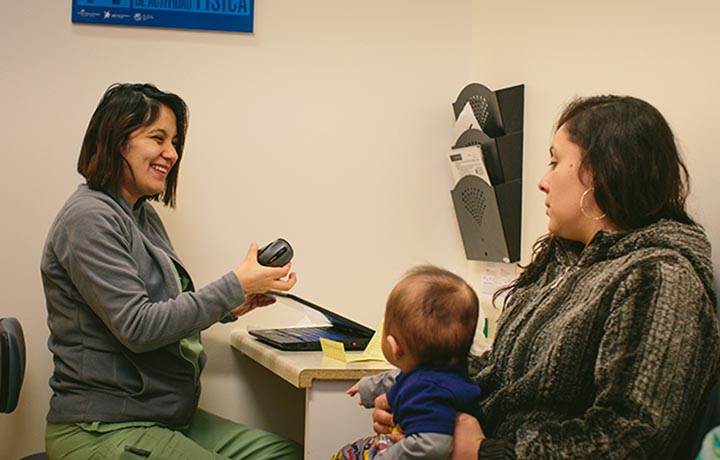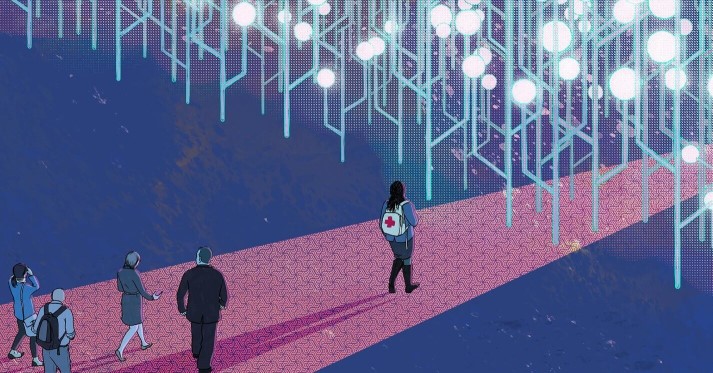Article
Caring for immigrant patients in a time of crisis
By Gale Pryor | July 3, 2018

Esperanza Health Centers, a Chicago-based federally qualified health center serving the largest population of Latino immigrants in the Midwest, understands the lives of its patients and their families, and tailors care accordingly.
Jessica Boland, LCSW and Esperanza's director of behavioral health services, speaks below about the impact of U.S. immigration policy on the health of Esperanza's patients, 95 percent Spanish-speaking from Central and South American countries, and what providers can do to help.
We have seen a change in our patients presenting complaints and issues. Shortly after the 2016 election, there were reports of suicides and mental health crises among people with DACA status. We have been on high alert, increasing our screening measures for suicidal thoughts, depression and anxiety symptoms.
Overall, there has been a severe uptick in fear and anxiety in both adults and children, and among youngest children — very literal fears that people are going to knock on their door and take away their parents. Those fears may manifest in behavior changes, such as refusing to go to school, “clinging,” or regressive behaviors, such as a toilet-trained child who suddenly begins to have accidents.
The public schools issued very direct statements to families saying that immigration officials are not allowed on school property without warrants.
Those statements weren't a reaction to actual actions being taken, but to a general atmosphere. Stories of raids by ICE [U.S. Immigration and Customs Enforcement] like those recently in Tennessee and Ohio, and the administration’s promise to hammer down on sanctuary cities, have led to rumors and worries that government institutions, such as schools, may be targets as well.
Some families were choosing not to send their children to school, or their children were refusing to go this past school year.
There are just a lot of unknowns for them. When undocumented adults have jobs, for example, they worry about repercussions for their employers or raids at their places of employment – again, these fears are founded by recent events.
That anxiety often manifests as somatic complaints: insomnia, gastrointestinal complaints, and panic attacks. At Esperanza, we have not noticed a decrease in visits or health-seeking behavior, which we see as a positive sign. But we have seen an uptick in patients presenting with mental health issues or stress-related complaints.
We've been in the community for over a decade, have strong partnerships with community organizations, and have really worked to cultivate trust with our patients. We've made use of different platforms, like social media, to reiterate Esperanza's mission and our commitment to meeting the needs of our community, especially at this moment in history when they are vulnerable.
We have been explicit that we do not cooperate with immigration authorities, and that they're not allowed in our premises without signed judicial warrants. We put “Know Your Rights" handouts in English and Spanish at the front desk with information on who to call if there is a raid. More recently, Esperanza has teamed up with a local organization to combine communitywide efforts to disseminate crucial information, including how to accept emotional support.
I have joined forums at different elementary schools in the area to speak about the mental health effects of the current political climate, and how to talk to children about it. We make sure patients know that they can come to us and ask questions if they are dealing with these issues, and we reiterate that we are a safe place whenever we interact with patients.
Working with an integrated healthcare approach, we know about the long-term impact on health of trauma and adverse childhood events: mental health affects physical health and vice versa. In children and young people, this kind of event can affect their outlook on their future and how they perceive themselves.
For example, I now see preteens and teenagers feeling like it's not worth it to continue with school. They think, “Why bother? I'm not going to be able to go to college anyway. I'm not going to be able to qualify for DACA, because it's going to go away."
And those feelings of hopelessness or giving up open the door for high-risk behaviors, getting involved with the criminal justice system, and maybe going down a path that they might not have gone down otherwise. Some individuals turn to substance abuse as a means of coping with high stress levels and uncertainty. Having services in place, such as medication-assisted treatment (MAT) services or linkage agreements with treatment providers, can be a way to help avert unhealthy behaviors and their consequences.
In adults, stress often presents somatically: chronic headaches, chronic gastrointestinal distress, or high blood pressure. I talk to both young patients and adults about anxiety symptoms – an exaggerated response to a fear – but in this case, their fears are real. The response is not necessarily exaggerated. Patients need help coping with a very real threat while continuing to function day to day. Having nonjudgmental support available and onsite is crucial for vulnerable patients.
Yes, there certainly have been. Our pediatricians see children who have had a parent deported. We encourage mental health counseling for them whenever possible, either support for children on an individual level, or family therapy for the caregiver or the parent who has remained to help support that loss, and that separation, and the ramifications of it. We really want to make sure that we're offering as much support and as many resources as we possibly can.
There's a domino effect, things like kids missing vaccinations because they're avoiding interacting with the health system. Benign issues that can become a lot more serious, and costly, if they're neglected.
A lot of our physicians and providers are also immigrants from Latin American countries. They've done their studies here and pursued careers here, so it can affect them. They have a mission to work in this particular community; they are really invested in their patients' lives. I've heard – and I can speak to this personally – that in the current situation, we double down on our mission. The climate has rededicated us to our work. This is an especially vulnerable moment for a community that always been underserved. And now it's at even more risk.
Gale Pryor is senior editor of athenahealth's Knowledge Hub.






